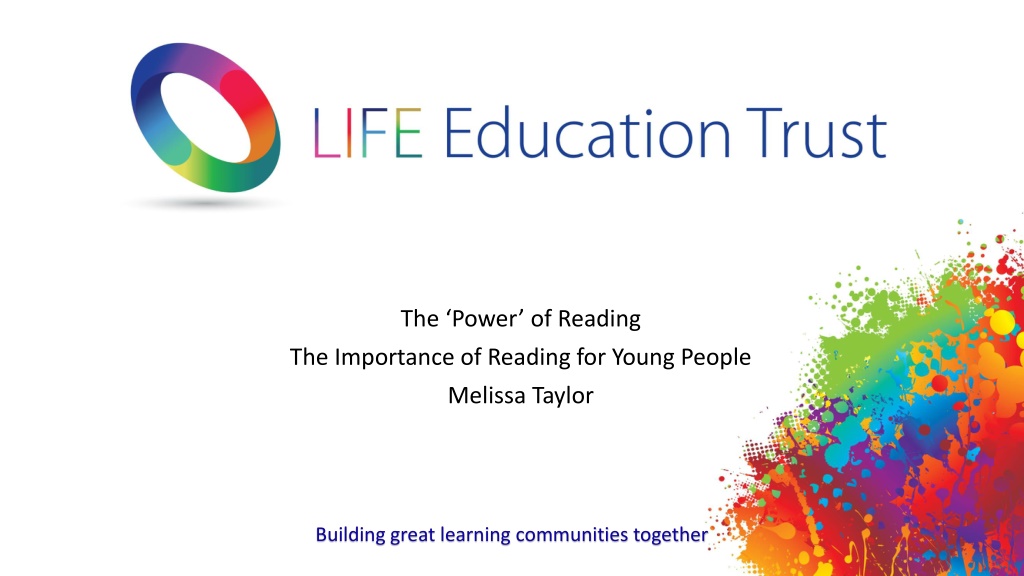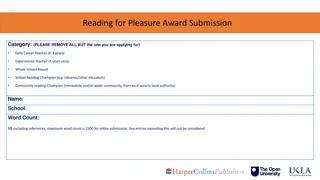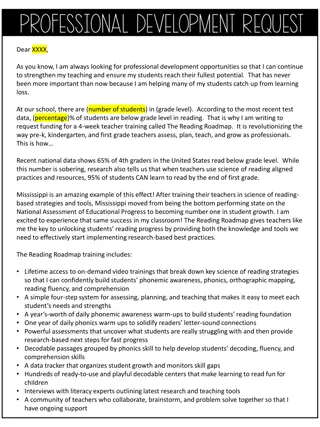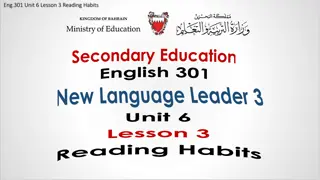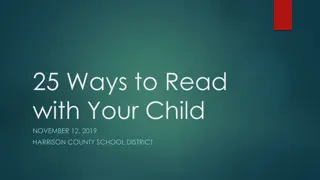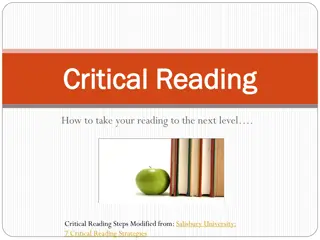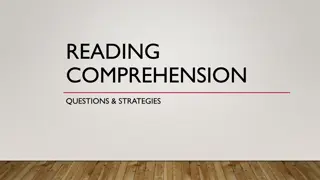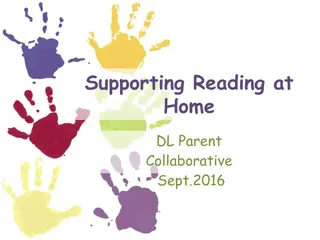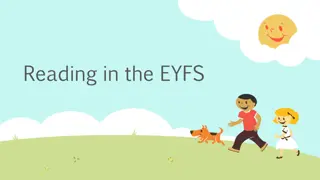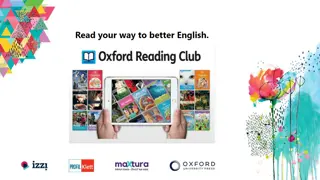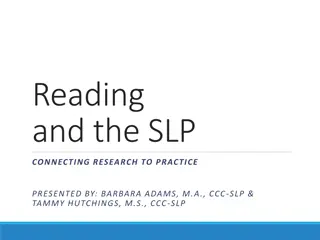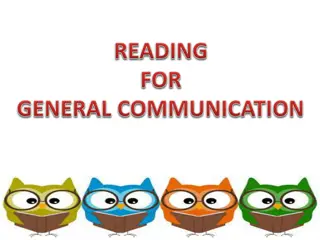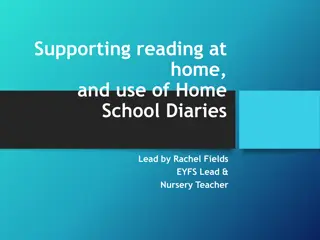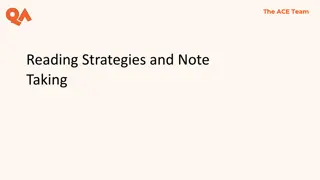Unlocking the Power of Reading: Importance and Impact
Delve into the significance of reading for young individuals, exploring learning methodologies, research in reading policy, and real-life school case studies. Discover the profound impact of daily reading on children’s word exposure and cognitive development, highlighting the complexity of the reading process from basic recognition to advanced interpretation. Uncover the critical role of reading in education and academia, shedding light on the intricate nature of this fundamental skill.
Download Presentation

Please find below an Image/Link to download the presentation.
The content on the website is provided AS IS for your information and personal use only. It may not be sold, licensed, or shared on other websites without obtaining consent from the author. Download presentation by click this link. If you encounter any issues during the download, it is possible that the publisher has removed the file from their server.
E N D
Presentation Transcript
The Power of Reading The Importance of Reading for Young People Melissa Taylor Building great learning communities together
Aims of this session To understand the importance of reading. To understand how we learn to read successfully. To understand the importance of research in reading policy and pedagogy. To examine a case study of reading in one of the LIFE schools.
Reading Would anyone like to share their experiences/memories of learning to read? Was it a positive experience?
Reading Assessment Have a go! Read the passage in front of you. You will have 10 minutes. Tasks: 1. Highlight any words that are unfamiliar to you. 2. Highlight any words that might be unfamiliar to a 10/11 year old. 3. Answer the following question: What job did the Grandad do?
Reading Assessment Have a go! How did that exercise make you feel? What must it be like for a child?
The Importance of Reading Children who read for 20 minutes everyday are exposed to 1.8 million words a year. Children who read on average for 4.6 minutes a day are exposed to 282,000 words a year. Children who read for less that one minute a day are exposed to 8,000 words a year. So it would take a child who reads for less than one minute a day a whole year to read the number of words that a child who reads for 20 minutes a day would read in 2 days
Reading is one of the most complex acts of the human mind: it involves everything from basic pattern recognition to complicated problem solving. Yet, while teaching reading to children receives great attention within schools of education, scholars in the humanities have been far less systematic in their understanding of adult reading. Literary scholars even use reading as a synonym for interpretation; in literary criticism, a reading of a poem or novel means not the act of reading it, but the interpretation of it according to strict disciplinary norms. Stanford University Press, 2018
What is reading? The standard approach for dividing up the possibilities is to talk about skimming (cruising through the text to get the gist), scanning (looking for specific information) and linear reading (reading all the way through). Naomi S Baron, How We Read Now (2021)
How We Read The Skills Activating prior knowledge Predicting Understanding vocabulary Inferring Reading for meaning Making comparisons Scanning Generalising Paraphrasing Navigating Summarising Skimming
How We Read Ofsteds View The breadth of vocabulary is key to being a GOOD reader. What we ALREADY KNOW allows us to read. Knowledge enables us to comprehend. Reading knowledge is transferrable. Teaching a high quality curriculum that teaches ALL subjects enhances a child s vocabulary.
Being a good reader Whilst good readers gain new skills very rapidly, and quickly move from learning to read to reading to learn, poor readers become increasingly frustrated with the act of reading, and try to avoid reading where possible. Question: does your social class relate to how good you are at reading?
Being a good reader The foundations of what children learn at primary school impact on their success as a reader and ultimately their success and life chances at secondary school and beyond. This lead me to ask the question: How can we make ALL of our children into good readers?
A Case Study: The Power of Reading The Power of Reading scheme was chosen at MPS to foster a love of reading amongst children and to provide them with high quality and exciting stimuli which they are engaged in and can write from. I hoped that it will support staff with the planning and delivering of English lessons as well as support the progress of the children by: Engaging children in reading and writing Increasing opportunities for extended writing Increasing the creativity of English lessons
The Power of Reading The teaching sequences come from a list of quality texts for each year group as provided by the Centre for Literacy in Primary Education (CLPE). These texts are identified as being quality in terms of content, subject, and relevance to specific year groups. Where appropriate the quality whole texts have been linked to the topics being taught within the school to increase the opportunities for writing across the curriculum and to support the children s transference of skills across a range of subjects.
The Power of Reading The aim for all sequences was to totally immerse the children in a whole text (moving away from the use of short extracts). Time is spent making predictions, discussing events in the story, reflecting on character s thoughts and feelings, using the arts to explore key parts of the book, engaging in longer pieces of writing and linking the story to similar stories that they may have already experienced.
Key Findings of my own research Creativity is key for children to enjoy school, to remember what they have learnt, to inspire learning and be inclusive of children of all backgrounds. The Power of Reading lead to sustained excellent results (way above threshold) in reading and writing over time at the end of Key Stage 2.
Children reading at home As well as children reading in school, we ask that children read at home each night for at least 20 minutes. Reading diaries are used to record this. With the Power of Reading, children were actually more inspired to read at home!
The Results (MPS) 2020 TA 100% 2021 TA 92% 2017 2018 2019 90% 100% 91% Reading Expected Reading Greater Depth 36% 42% 50% 25% 45% n/a N/A Reading Scaled Score 108 107 109 n/a N/A Reading Progress Writing Expected Writing Greater Depth +3.5 +2.5 +7.1 100% 92% 90% 100% 91% 36% 25% 50% 36% 36% n/a N/A +3.8 +4.5 +5.6 Writing Progress Maths Expected Maths Greater Depth 100% 92% 90% 93% 91% 36% 25% 20% 0% 36% n/a N/A 107 105 108 Maths Scaled Score n/a N/A +2.6 +1.4 +5.2 Maths Progress Combined Expected Combined Greater Depth 100% 92% 90% 91% 91% 36% 25% 10% 0% 36%
The Four Rural Primary Schools The success of the Power of Reading in Margaretting and then Roxwell meant that it has now been adopted by the 4 Rural Primary Schools in the Trust and possibly beyond Training was given to all teachers by me last academic year. Schools are moderating together to ensure consistent standards. This year it will be embedded, it is an exciting journey!
Being able to read and write is crucial to a childs chances of success in life that is the POWER of Reading
